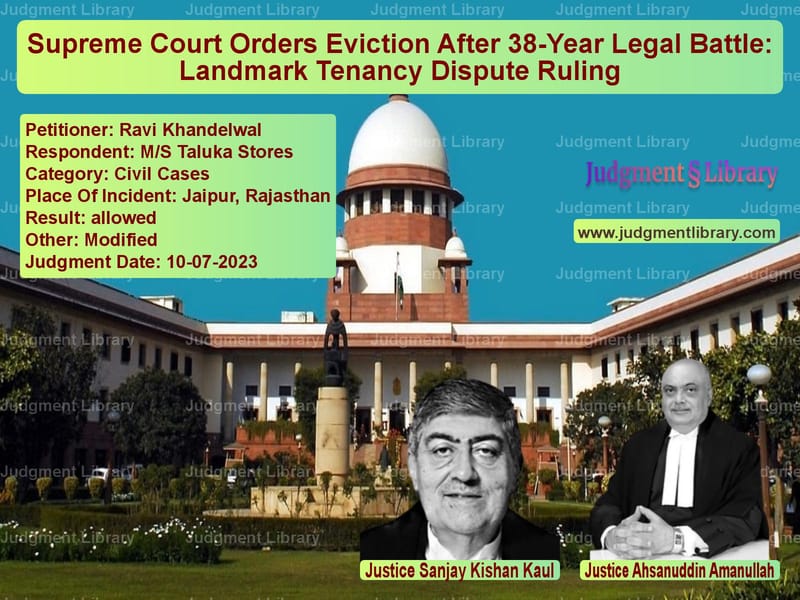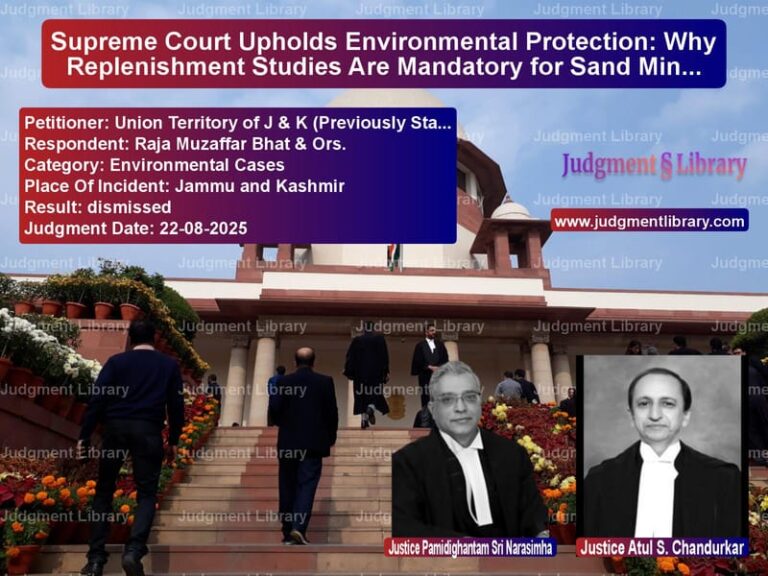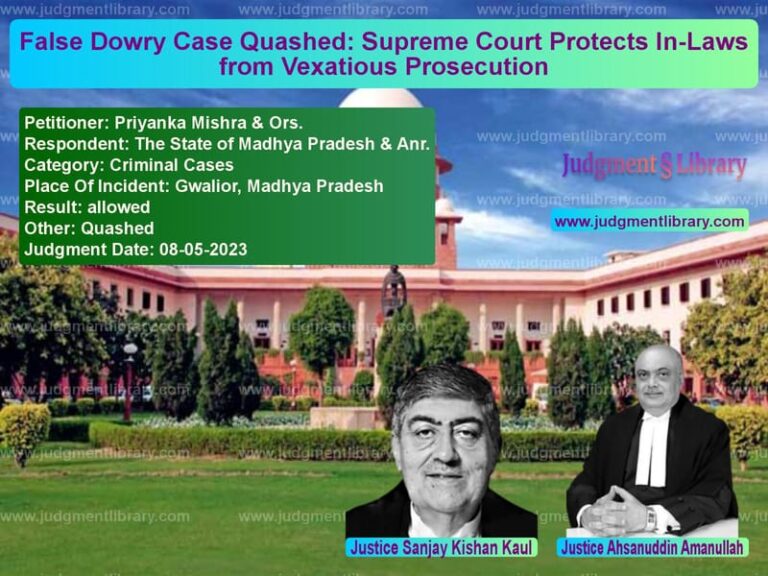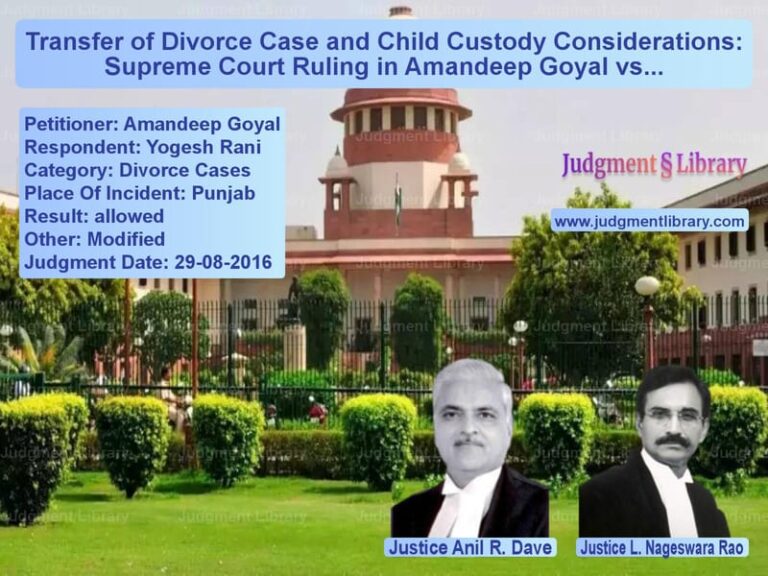Supreme Court Orders Eviction After 38-Year Legal Battle: Landmark Tenancy Dispute Ruling
The case of Ravi Khandelwal v. M/S Taluka Stores is a significant ruling by the Supreme Court that resolved a long-standing tenancy dispute. The Court ruled in favor of the landlord, ordering the eviction of the tenant after 38 years of litigation. The ruling provides clarity on the interpretation of Section 14(3) of the Rajasthan Premises (Control of Rent and Eviction) Act, 1950, which prevents eviction suits from being filed within five years of the tenancy.
Background of the Case
The dispute concerns a shop located in Kamani Mansion, Paanch Batti, MI Road, Jaipur. The appellant, Ravi Khandelwal, purchased the property on January 30, 1985, while the respondent, M/S Taluka Stores, was already occupying the shop as a tenant.
The landlord sought eviction on the grounds of bona fide necessity and filed a suit on May 21, 1985. However, the trial court dismissed the suit on October 30, 2002, citing Section 14(3) of the Rajasthan Premises Act, which prohibits eviction suits within five years of tenancy commencement.
The landlord appealed, and in March 2004, the Additional District Judge ruled in his favor, finding that the premises had been leased in 1958, making the eviction suit valid. The tenant then approached the High Court, which referred the case to a larger bench due to conflicting interpretations of Section 14(3).
Key Legal Issues
- Does Section 14(3) create an absolute bar on filing eviction suits within five years?
- Can a case filed prematurely be considered valid if the five-year period expires during the proceedings?
- Was the tenant unfairly protected due to prolonged litigation?
Petitioner’s (Landlord’s) Arguments
The appellant, Ravi Khandelwal, argued:
- The original lease was granted in 1958, making the five-year restriction inapplicable.
- The intent of Section 14(3) was to protect new tenants, not long-term occupants.
- Requiring the landlord to file a fresh suit after 38 years of litigation would be unfair.
- Similar clauses in other tenancy laws, like the West Bengal Premises Tenancy Act, had been interpreted to allow suits filed prematurely to continue once the restricted period had expired.
Respondent’s (Tenant’s) Arguments
The tenant countered:
- Section 14(3) explicitly bars eviction suits within five years of tenancy.
- The eviction suit was filed in 1985, allegedly within five years of a lease renewal in 1982.
- The landlord should be required to file a fresh eviction suit instead of relying on the 38-year-old case.
Supreme Court’s Observations
The Supreme Court found the tenant’s arguments unconvincing and ruled in favor of the landlord.
On the Interpretation of Section 14(3)
The Court clarified that Section 14(3) provides temporary protection to tenants for five years but does not make the suit permanently invalid. It ruled:
“The purpose of Section 14(3) is to grant protection for five years, not to indefinitely bar eviction proceedings.”
The Court also referred to the precedent set in B. Banerjee v. Anita Pan, where it was held that the protection period should be interpreted flexibly.
On the Tenant’s Prolonged Protection
The Supreme Court criticized the delay in resolving the case, noting that the tenant had benefited from nearly four decades of legal protection despite having no valid claim to continued occupancy. It stated:
“The passage of 38 years has rendered the original five-year protection irrelevant. To now ask the landlord to restart proceedings would be a mockery of justice.”
On the Need to Conclude Litigation
The Court invoked its powers under Article 142 of the Constitution to provide complete justice and prevent further delay. It ruled:
“The landlord should not have to file a fresh suit and endure another prolonged legal battle. The eviction decree is affirmed.”
Final Judgment
The Supreme Court:
- Allowed the appeal and ruled in favor of the landlord.
- Ordered the tenant to vacate the shop by September 30, 2023.
- Rejected the tenant’s plea for a fresh trial, citing Article 142 to ensure fair and timely justice.
Implications of the Judgment
This ruling has significant implications for tenancy disputes:
- Limits to Tenancy Protections: Tenants cannot indefinitely delay eviction by exploiting legal loopholes.
- Judicial Efficiency: Courts must prevent excessive delays that undermine the purpose of tenancy laws.
- Landlord Rights Strengthened: Property owners cannot be forced into prolonged litigation due to outdated legal provisions.
Conclusion
The Supreme Court’s decision in Ravi Khandelwal v. M/S Taluka Stores underscores the importance of fair legal proceedings in tenancy disputes. By ruling in favor of the landlord after 38 years of litigation, the Court reaffirmed the principle that justice must not be indefinitely delayed. This landmark ruling sets a precedent for future tenancy cases, ensuring that property owners are not left in legal limbo for decades.
Petitioner Name: Ravi Khandelwal.Respondent Name: M/S Taluka Stores.Judgment By: Justice Sanjay Kishan Kaul, Justice Ahsanuddin Amanullah.Place Of Incident: Jaipur, Rajasthan.Judgment Date: 10-07-2023.
Don’t miss out on the full details! Download the complete judgment in PDF format below and gain valuable insights instantly!
Download Judgment: ravi-khandelwal-vs-ms-taluka-stores-supreme-court-of-india-judgment-dated-10-07-2023.pdf
Directly Download Judgment: Directly download this Judgment
See all petitions in Landlord-Tenant Disputes
See all petitions in Property Disputes
See all petitions in Judgment by Sanjay Kishan Kaul
See all petitions in Judgment by Ahsanuddin Amanullah
See all petitions in allowed
See all petitions in Modified
See all petitions in supreme court of India judgments July 2023
See all petitions in 2023 judgments
See all posts in Civil Cases Category
See all allowed petitions in Civil Cases Category
See all Dismissed petitions in Civil Cases Category
See all partially allowed petitions in Civil Cases Category







